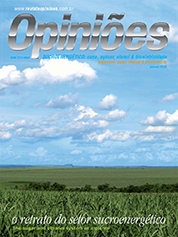Julio Maria M. Borges
Executive Director of JOB Economia e Planejamento
Op-AA-25
The industry at a glance
As we have emphasized in recent years, our future began in 2004, when oil started out on a price increase trajectory, reflecting a tight balance between global supply and demand. At that time, we noticed growing demand for energy, in combination with global economic growth, increasingly less dependent on rich countries.
In the case of oil, we noticed restricted supply, with increasing long term marginal costs, due to new reserves also entailing increasing prospection, exploration and environmental preservation costs. This reasoning is equally applicable to electricity. Therefore, market fundaments for sugar, ethanol as fuel and electric power co-generated in the mills are highly positive for a simple reason: Brazil, at this point in time, has the best economic conditions to meet the growing world demand for sugar, electric energy and clean and renewable fuel.
Ethanol as fuel, which in the period 1995-2004 was a “native” Brazilian product, became an energy commodity with global aspirations, politically and environmentally correct. This condition in no way is related to the producers’ years of scarcity in the eighties and nineties, when relatively cheap oil induced politicians, university professors, entrepreneurs and areas of the government, sharing a common shortsightedness, to view ethanol fuel as a necessary evil.
What are the lessons that we Brazilians learned in the period 1995-2004? Below we mention a few that stand out.
1. The best way to sustain economic activity in the long term is by being competitive. Thus, producers invested in Research and Development to significantly reduce the production cost of ethanol, while waiting for oil, a finite natural resource, to show its impossibility to, in the long term, sustain growing world demand at relatively low prices.
2. The Brazilian strategy of import substitution (reduction of the dependence on imported oil) proved correct in the long term. In fact, the U.S. government is currently, 30 years later, adopting this same strategy for its renewable fuel program.
3. The presence of the State in the economy has proven an important support mechanism in the initial phase of any new economic activity. However, the perpetuation of this condition inhibits economic efficiency and growth of the business when such activity consolidates.
4. Poor management is a very efficient means to eliminate companies from the market. Good management occurs when the focus is on results, translated to minimal possible costs and maximum possible revenues. The recipe for success is simple. Its practice is the difficult part.
5. Market risks exist and can be minimized through good monitoring of movements and a good protection strategy. Furthermore, good financial management is essential to maximize profit in the long term.
6. The attempt to perpetuate a “traditional” management model in a market in transformation is suicide. Creativity, innovation and courage to try to change, in the end are worthwhile.
What future can we expect?
1. Large agro industrial groups with activities in the country’s sugarcane industry, professionally and efficiently managed. Their operations will be vertically integrated in their business. In this respect, economic groups lacking this option will have competitive disadvantages.
2. Small companies and groups have been inclined to seek some type of association, seeking their economic survival.
3. Small independent companies and groups, as our experience at JOB Economia shows, will rely on their operation as the basic condition for survival, taking advantage of particular comparative advantages. Thereby they may assure excellent results that may provide them good opportunities to sell the business.
4. Intermediation between seller and buyer tends to decrease. Large groups are willing to look for the end client directly. Long term commercial contracts are increasing their share in traded sugar and ethanol volumes.
5. The export logistics of sugar and ethanol is improving and is expected to remain like this due to economic feasibility reasons of investments in infrastructure.
6. Marketing the harvest will increasingly show less price variability and will increasingly be on a national rather than regional scale. Therefore, mills located in importing regions, as Rio de Janeiro, Espírito Santo and the Northeast, will enjoy competitive advantages that until then will have been of little importance.
7. The outsourcing of services in sugar and ethanol agribusiness will increase.
8. What will also increase is the need for health, safety, environment and social responsibility certifications.




